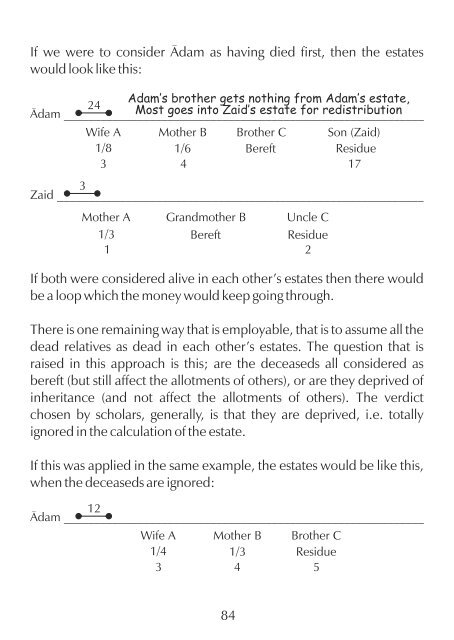Mirath - The Laws of Islamic Inheritance
http://www.islamicglobe.com/
http://www.islamicglobe.com/
Create successful ePaper yourself
Turn your PDF publications into a flip-book with our unique Google optimized e-Paper software.
If we were to consider ¬dam as having died first, then the estates<br />
would look like this:<br />
Adam’s brother gets nothing from Adam’s estate,<br />
24<br />
¬dam ___________________________________________________________<br />
Most goes into Zaid’s estate for redistribution<br />
Wife A Mother B Brother C Son (Zaid)<br />
1/8<br />
1/6 Bereft Residue<br />
3 4 17<br />
3<br />
Zaid ___________________________________________________________<br />
Mother A<br />
1/3<br />
1<br />
Grandmother B<br />
Bereft<br />
Uncle C<br />
Residue<br />
2<br />
If both were considered alive in each other’s estates then there would<br />
be a loop which the money would keep going through.<br />
<strong>The</strong>re is one remaining way that is employable, that is to assume all the<br />
dead relatives as dead in each other’s estates. <strong>The</strong> question that is<br />
raised in this approach is this; are the deceaseds all considered as<br />
bereft (but still affect the allotments <strong>of</strong> others), or are they deprived <strong>of</strong><br />
inheritance (and not affect the allotments <strong>of</strong> others). <strong>The</strong> verdict<br />
chosen by scholars, generally, is that they are deprived, i.e. totally<br />
ignored in the calculation <strong>of</strong> the estate.<br />
If this was applied in the same example, the estates would be like this,<br />
when the deceaseds are ignored:<br />
12<br />
¬dam ___________________________________________________________<br />
Wife A Mother B<br />
1/4<br />
1/3<br />
3 4<br />
Brother C<br />
Residue<br />
5<br />
84














